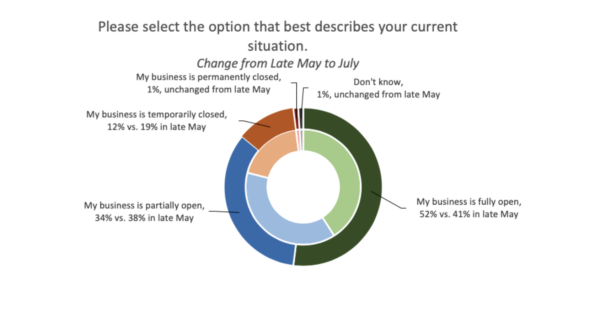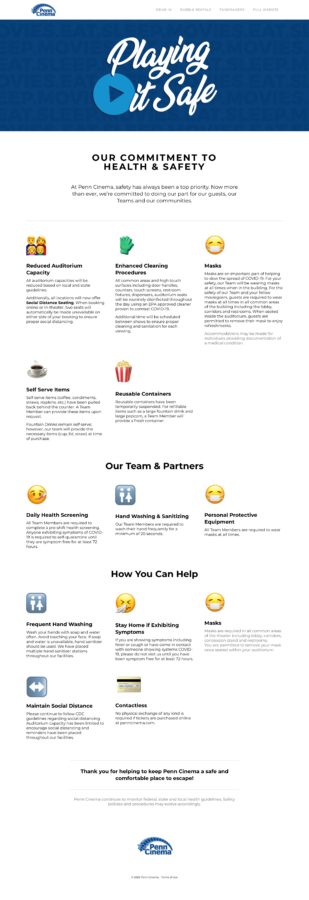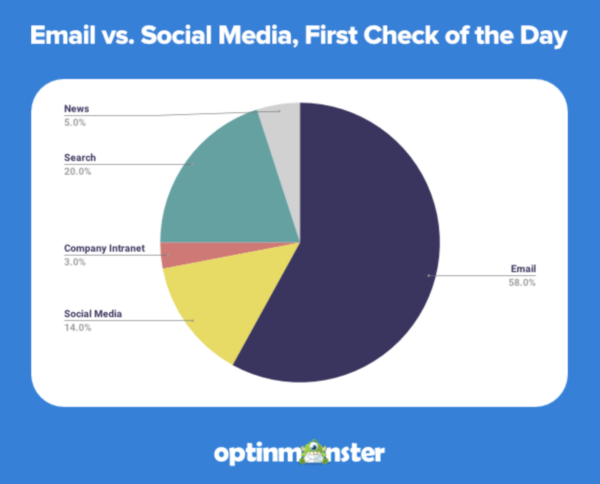During the pandemic, small businesses nationwide are shutting down at unprecedented rates. Despite recent government aid, many small businesses have had to let go of staff, reduce spending on marketing and advertising, or even close their doors for good.
In fact, reports show that as of May 2020, over 100,000 businesses had to close down across the US.
Fortunately, as virus numbers decreased in the months to follow, businesses were able to reopen. This reopening, however, did not come with its own set of challenges. As you can see in the following chart, the number of businesses that were fully open in July vs. May increased by 11%. And the number of permanently closed businesses remained largely constant.

This is a good sign for the future of business, but to maintain these positive numbers, businesses need to focus on growth and employ the right strategies to make it happen. Fortunately, there are plenty of ways businesses can keep their doors open and see sales growth even in the midst of the pandemic.
Let’s take a look at some actions your business should take to drive growth in the face of adversity.
Treat your staff the right way
How does treating your staff the right way relate to sales? That’s easy.
If you treat your staff poorly, you won’t have any staff available to help you stay in business and maintain growth.
Treating your staff poorly can also impact your business’ reputation. People talk, and if word gets out that you gave yourself a huge raise and then cut your teams’ salary in half (or let half of your team go) to pay for it, people are likely to boycott your business.
If you really want to grow your business during an adverse time such as the one in which we find ourselves, show your team that you are there to support them through the challenges you are facing in good times and in bad.
Provide your team members with the resources and guidance they need to get by. Avoid any pay cuts or layoffs unless absolutely necessary. If you do have to lay off some of your team, offer them assistance in finding a new job or getting signed up for unemployment, and then bring them back once you are able to do so.
Your loyalty to your staff will pay off in the form of loyalty back to you. That loyalty will translate into a desire to work together to help the business grow and thrive, thus leading to the ability to grow your revenue, even in times of adversity.
Shift to low cost marketing tactics
During adverse times, many businesses are forced to revisit their marketing and advertising expenses. It’s easy to just cut out these efforts altogether. The problem is, marketing and advertising can be the lifeblood of your customer generation.
So, how do you keep your promotional efforts going during challenging times without breaking the bank?
Shift your tactics to lower cost efforts like content marketing, social media and SEO. While these do take a certain level of skill and time to gain true value, if used properly, these tactics can give your business a boost while lowering your promotional budget.
To give you an idea of the cost-cutting opportunities here, studies show that content marketing can cost up to 62% less than traditional marketing efforts.
Content is the cornerstone to building relationships with your customers, and it also helps with SEO and gives you material to send out over your social media channels. By orchestrating a strategy that involves creation of targeted, high-powered content, sending that content out over social media and executing a strong SEO strategy, you can increase the traffic to your website, and with that, the number of inbound, qualified leads.
Provide customers with reassurance
Whether it’s dealing with a pandemic or any other type of adversity, it’s critically important to reassure your customers that you have their best interests in mind.
In today’s climate, for example, businesses can benefit from being transparent about how they are protecting clients from the virus. By providing these details, you create a level of comfort with your customers and they will feel at ease coming into your stores.
A great example of this is Penn Cinema, a small Pennsylvania movie theater chain. They’ve started showed older films inside, and they have an excellent (and non-alarming) web page dedicated to letting customers know what they are doing to ensure their safety.

If you fail to create this level of comfort, your customers will go next door to the competitor whose staff members are wearing masks, getting temperature checks, or limiting the number of people allowed in a store or restaurant at one time.
This goes for any type of adversity. In a bad economy, let your customers know your plan to stay afloat and assure them that you will be there to support them. Consumers are more likely to buy from your business if they know you’ll be there in the future for customer support, returns and repairs if necessary or any other form of assistance they might need.
By reassuring your customers that you will be there for them and you have their best interests in mind, they will continue to spend their money with you, rather than with your competition.
Build your email list
By offering free downloads, coupons, discounts and other incentives, you can build a high-quality email list that gives you direct access to your customers’ inboxes. A targeted, opted-in list can be a huge advantage for your business during tough times.
Email marketing gives you a direct channel to send out segmented, more personalized emails to your customers to maintain relationships and keep your brand top of mind.
You can also use your email platform to provide further incentive, once people sign up, for them to stop by your establishment and make a purchase (or make a purchase online).
Offer exclusive discounts and other content to your subscribers to ensure you optimize your open, click and conversion rates. People tend to check their email before checking anything else, so if you get your message right, you can really take advantage of this medium and give a boost to your business.
These stats from Optin Monster highlight the importance people place on email, with 58% of survey respondents saying they open their email first in the morning.

Email is effective from both a cost and conversion perspective. If you get this right, you really position yourself to weather any storm.
Collaborate with complementary companies
As Joe Cocker famously sang, “I get by with a little help from my friends.” This concept applies to business as much as it does to personal friendships.
By collaborating with complementary companies, you can promote one another’s businesses and lend a helping hand.
For example, customer A goes into the party supply store down the street and makes a purchase for an upcoming birthday party. The owner asks if the customer has considered your store down the street, which happens to make the best birthday cakes in town.
Customer A hasn’t settled on a cake supplier yet, and the party supply store owner just happens to have your coupon on file.
Later that week, when Customer B stops by your store looking for a cake, you bring up the party store and let them know you can set them up with a great deal.
By collaborating like this, you can boost one another’s businesses and grab some revenue that you may otherwise have missed out on.
Wrapping it up
The most important thing to do when faced with adversity is to not panic. Take a deep breath and then get to work.
You’ll need to make some changes to your operations, and things will certainly look different for a while, but if you employ the right tactics, you can enjoy continued success and come out of things unharmed on the other side.
While we are in the midst of a pandemic right now, even when we come out on the other side of this, we haven’t seen the last of adversity as business owners.
So, be sure to take what you learn during this experience and then develop a disaster plan. That way, if anything unexpected pops up in the future, you’ll have a plan in place to keep rolling along.